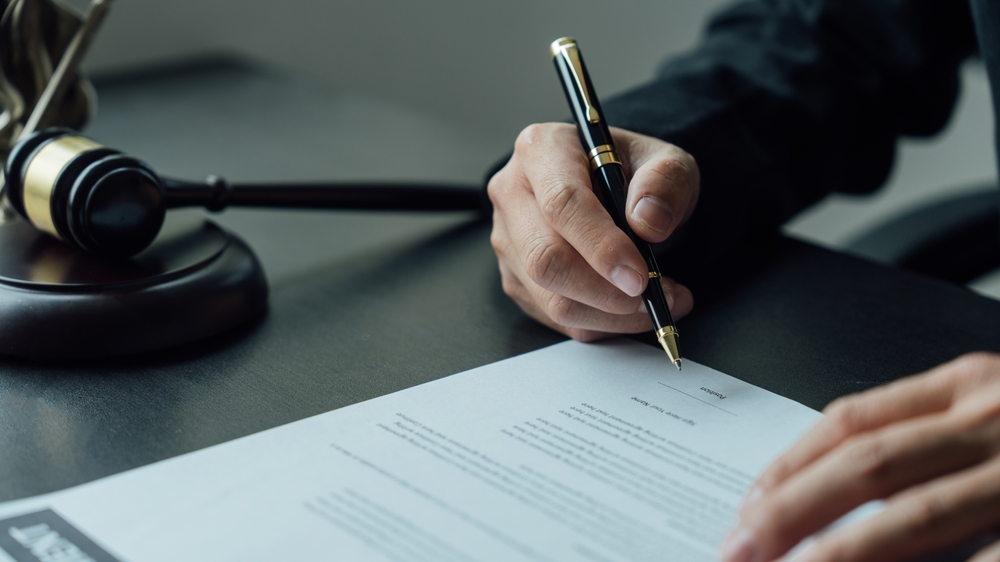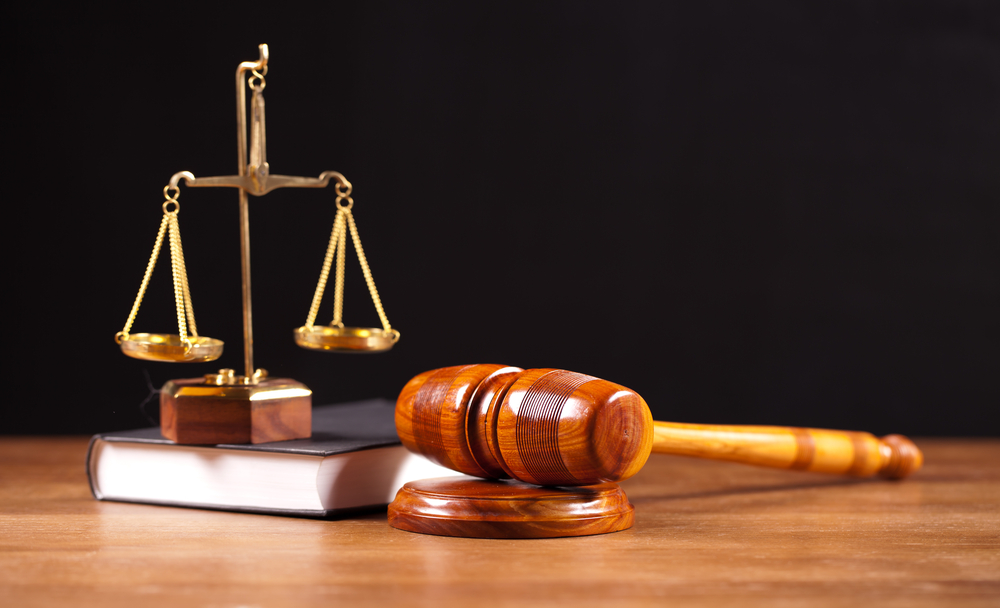RESOLUTION
For many, a lawsuit after an accident is their first experience with the legal system. It's common for accident victims and their families to feel overwhelmed at the prospect of a personal injury claim worried it might lead to a stressful trial.
However, most cases conclude without requiring a court appearance. This blog will clarify the process for you, from your first meeting with a Feasterville personal injury attorney to the final resolution of your case.
Get A Free Consultation Today!
How Do I Start My Personal Injury Claim?

If you've suffered an injury due to someone's negligence, the first step—after seeking medical attention—is to schedule a meeting with an experienced personal injury attorney. This initial consultation gives you a professional assessment of your claim's validity.
To make the most of this meeting, come prepared. Gather relevant documents, such as medical records, any correspondence related to the incident, and notes detailing your experience and how your injury has impacted your life.
You might wonder about the cost of this consultation. The good news is that most personal injury lawyers offer this first meeting free of charge. This means you can get legal advice on your situation without any financial obligation.
During this consultation, the attorney will listen to your story, review your documents, and provide you with an understanding of your legal options. They'll also explain how they can aid with the claims process, aiming to secure the compensation you deserve while you focus on your recovery.
This step is about establishing a partnership based on trust, setting the foundation for pursuing your claim effectively.
What Should I Consider When Evaluating a Personal Injury Lawyer?
Choosing the right personal injury attorney can significantly influence the outcome of your case. It's about finding an advocate genuinely invested in your recovery and success. When you meet with a potential attorney, assess their experience, communication style, and approach to handling cases like yours.
- Experience and Success Rate: Ask about the attorney's experience, specifically with cases similar to yours. Understanding their track record of success in these cases can give you insight into how well they might manage your claim.
- Communication: Ask about their policy for updating clients on their case's progress. You'll want an attorney who is accessible and willing to answer your questions throughout the process.
- Questions and Assessments: A competent attorney will ask you detailed questions to grasp the full scope of your case. This thorough understanding allows them to represent your interests effectively.
- Realistic Expectations: Be cautious of any attorney who promises a specific compensation amount during the initial meeting. Estimating the value of your case takes time and a detailed evaluation of all factors involved. A reputable lawyer will focus on providing a realistic assessment rather than making premature promises.
This stage is more than just evaluating an attorney's qualifications; it's about determining if they fit you. Feeling comfortable and confident in your attorney's ability to advocate on your behalf is key. Remember, this partnership aims to secure the best possible outcome for your case.
How Does Hiring a Personal Injury Attorney Work and How Are They Compensated?
Many people are relieved to learn that most personal injury attorneys work on a "contingency fee" basis. But what does this mean for you, and what should you expect regarding attorney fees?
A contingency fee arrangement means you won't pay any upfront fees. Your attorney's payment is contingent upon winning your case; they only get paid if you receive compensation. This setup aligns your attorney's interests with yours, as they are motivated to secure the best possible outcome for your case.
If your case succeeds, the attorney's fee will be a percentage of the total compensation awarded, typically 25 to 40 percent. The percentage can vary based on factors such as case complexity, the stage the case concludes, and other considerations. It's important to discuss this percentage early on to have clear expectations.
Upon hiring an attorney, you'll sign a contract outlining your agreement's terms, including the specific contingency fee percentage.
This is a good time to ask any lingering questions about the fee structure or other aspects of your representation.
Inquire about potential additional costs during your case and how the attorney handles them. For example, ask whether the contingency fee covers expenses like court fees or costs for obtaining medical records or if they are separate.
By clearly understanding the financial and contractual aspects of hiring a personal injury attorney, you can focus on what matters most—your recovery and the successful resolution of your case.
What Happens During the Investigation Phase of My Personal Injury Case?

After you've chosen to work with a personal injury attorney and have discussed the terms of your agreement, the next step is to investigate your case. This phase involves gathering comprehensive details about the incident, your injuries, and the impact those injuries have had on your life.
Here's what you can expect during this stage:
In-depth Case Analysis
Your attorney will begin by conducting a thorough investigation to understand the circumstances of your injury. This includes reviewing police reports, medical records, and other documentation that can shed light on what happened and who is at fault.
Calculating Damages and Costs
Part of the investigation involves assessing the full extent of your injuries, which is not limited to the physical aspect. Your attorney will consider how your injuries have affected your ability to work, your daily life, and your overall well-being. This approach ensures that any compensation sought covers both current and future needs.
Communicating with Insurance Companies
Your attorney will handle all communications with the insurance company of the party at fault. This includes negotiating with the insurance adjusters and, if necessary, dealing with lawyers representing the other side. By taking on this responsibility, your attorney allows you to focus on your recovery without the stress of these discussions.
Keeping You Informed
Your attorney will update you on significant developments and negotiations throughout this process. Transparent communication is key to maintaining trust and ensuring you're always aware of where your case stands.
Your Role in the Process
While your attorney works hard on your case, your primary focus should be healing. Follow your medical provider's advice, attend all medical appointments, and try to return to your normal life as much as possible. Your well-being is the priority, and taking care of your health is important for your recovery and your case's strength.
The investigation stage sets the groundwork for your claim, aiming to build a strong case that accurately reflects the full impact of your injuries. With a detailed understanding of what happened and a clear assessment of your damages, your attorney is well-prepared to fight for the compensation you deserve.
How Does Settling My Personal Injury Case Before Filing a Lawsuit Work?
People often resolve personal injury claims without the need to file a lawsuit. This path can often lead to a quicker settlement and can be less stressful for you.
Here's an overview of this process and how individuals make decisions.
Negotiating with the Insurance Company
The negotiation begins once your attorney has gathered all necessary information and understands the extent of your injuries and other losses. Your attorney will then participate in discussions with the at-fault party's insurance company, advocating on your behalf to secure a fair settlement.
Evaluating Settlement Offers
The insurance company will likely extend a settlement offer after negotiations. A lawyer will advise whether it adequately compensates for your injuries and losses.
Making the Decision
Although your attorney will guide and advise you, accepting or rejecting the settlement offer ultimately rests with you. Considering your attorney's advice is important, as they have experience with such matters and understand what constitutes a fair settlement.
Understanding Your Case's Worth
Making an informed decision involves understanding what your case is worth. Factors influencing this include the severity of your injuries, the impact on your quality of life, lost income, medical expenses, and future care needs. Your attorney will work with you to assess these aspects and support your understanding of the value of your claim.
Settling before filing a lawsuit can offer a less adversarial way to achieve a resolution. It allows you to avoid the uncertainties of a trial and can provide a more timely closure to your case. However, the settlement must adequately address the full extent of your damages and losses. Your attorney's role is to ensure you are fully informed and supported in making the right decision.
What Are the Pretrial Phases of Filing a Lawsuit in Court?

When negotiations fail to yield a satisfactory settlement, legal action becomes necessary. This initiates structured legal procedures to resolve your case through the court system.
This journey through the legal landscape can span months to years, heavily influenced by the case's complexity.
The Complaint and Answer Phase
The process begins with filing the Complaint, a document that lays out your allegations against the defendant, detailing the injury and the resulting damages.
This document is filed in a court with jurisdiction over the location of the incident or the defendant's residence, marking the official commencement of the lawsuit.
Following the filing, the plaintiff must personally serve the Complaint to the defendant, ensuring the defendant is officially aware of the legal action against them. The defendant then has a specific period, usually around 30 days, to respond with an Answer. In this document, the defendant will admit or deny the allegations brought forward in the Complaint.
The Discovery Phase
A comprehensive exchange of evidence, documents, and information pertinent to the case characterizes this phase. It's a foundational step in building your case, as it uncovers essential facts supporting your court claim.
Key activities during this phase include:
- Written Discovery consists of interrogatories (written questions) and requests for documents the opposing party must answer or fulfill.
- Depositions: Important figures in the case, such as witnesses and expert witnesses, are questioned under oath. The attorneys from both sides actively conduct these sessions, and the question-and-answer exchanges are available for potential use in court.
The Motions Phase
In this phase, either party may file motions requesting specific actions from the court. For instance, the defendant might seek certain claims or the entire case dismissed on legal grounds.
After filing a motion, the opposing party can submit a written response contesting the motion. The court may also schedule a hearing to deliberate on arguments from both sides before deciding.
Mediation in a Personal Injury Case
Mediation is an alternative pathway to resolving disputes outside the traditional courtroom setting. Either party can initiate this process at any stage of the case, and it involves the active participation of both parties, their attorneys, and a neutral mediator. The mediator's role is similar to that of a referee, facilitating dialogue and negotiation between the disputing parties.
During mediation, each side can present their case, including their claims and defenses, in a structured yet less formal environment. The mediator guides the discussion, helping both parties explore potential resolutions and negotiate a settlement.
One of the key characteristics of mediation is its non-binding nature. This means any settlement offer made during the process can be accepted or declined by either party, giving them significant control over the outcome.
What Happens When a Personal Injury Case Goes to Trial?
Taking a personal injury case to trial is a step taken when settlement negotiations fail or are deemed unsatisfactory.
At trial, your attorney will present your case to a judge or jury, outlining the extent of your injuries, the negligence of the defendant, and the damages sought.
Conversely, the defendant will have the opportunity to present their defense.
A personal injury trial typically unfolds in six phases:
- Jury Selection: The process of selecting a jury to hear the case and determine the outcome.
- Opening Statements: Both parties present an overview of their case and what they intend to prove.
- Witness Testimony and Cross-Examination: Witnesses provide their accounts of the events in question and are subject to cross-examination by the opposing party's attorney.
- Closing Arguments: A final summary of the case is presented by each side, aiming to persuade the jury of their position.
- Jury Instruction: The judge provides the jury with specific legal standards that must be applied when deciding the case.
- Jury Deliberation and Verdict: The jury deliberates privately, reaching a verdict on the liability and damages.
The Post-Trial Process
Even after reaching a verdict, concluding a personal injury lawsuit might take time. The defendant can appeal the decision, asking an appellate court to review the case and the applied legal principles. This can extend the resolution timeline.
If there is no appeal, or once any appeals conclude, the distribution of the monetary award begins. However, before receiving your portion of the settlement, any liens against the award must be satisfied. These are claims by entities (e.g., healthcare providers) that have provided services and are entitled to a portion of the compensation. Your attorney will manage these payments from a special escrow account designated for such purposes.
Finally, once your attorney addresses all liens and legal fees, they will issue a check for the remaining amount. This marks the end of your personal injury lawsuit journey, allowing you to focus on moving forward with your life, supported by the compensation you've rightfully secured.
Contact a Personal Injury Lawyer
Since securing compensation can extend from months to years, you should establish a strong, positive relationship with your lawyer. The attorney you choose can turn the scales in your favor.
Choose someone who aligns with your needs and values, ensuring you position yourself for the best possible outcome. Reach out to a lawyer today to start your personal injury claim.
